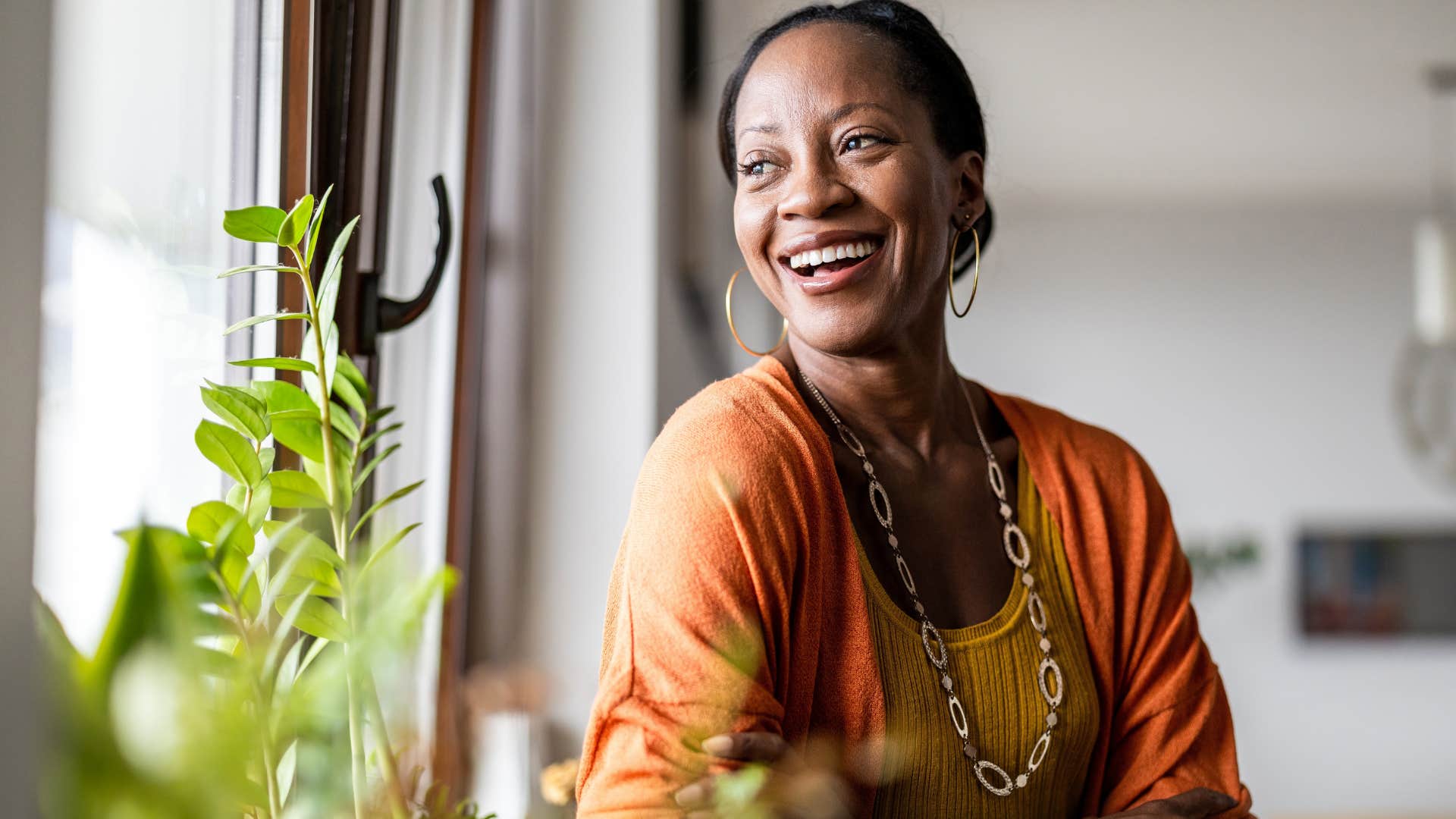11 Common Personality Traits Of People Who Have Zero Interest In Having Kids
They're actively combating toxic social stigmas and stereotypes about starting a family.
 Perfect Wave | Shutterstock
Perfect Wave | Shutterstock Despite societal pressures and social stigmas that pressure young adults, especially women, into having kids, there are certain demographics of people that resist — investing into themselves, their careers, and their personal growth rather than only focusing on starting a family.
Of course, not every childfree person lacks an interest in having kids. Sometimes, it's an entirely different discussion of age, infertility, or financial circumstance that serves as a barrier to starting a family, which can be left out of discussions about childfree individuals. However, there are some common personality traits of people who have zero interest in having kids that sets them apart from this first group, characterizing them as "intentionally" childless.
Here are 11 common personality traits of people who have zero interest in having kids
1. They're spontaneous
 oneinchpunch | Shutterstock.com
oneinchpunch | Shutterstock.com
Childfree people tend to be spontaneous and occasionally impulsive, contributing to their prioritization of a childfree lifestyle. They want to have the freedom to leave, go on an adventure, or even do absolutely nothing without feeling anxious or guilty about leaving a child behind.
When you become a parent, your world shifts. You're no longer living with only yourself in mind, but also a child that's dependent on you. For some people, that's empowering, but for intentionally childfree people, it can be suffocating.
2. They're self-aware
 Prostock-studio | Shutterstock.com
Prostock-studio | Shutterstock.com
While there are stereotypes and stigmas that characterize childfree adults as selfish, experts like licensed clinical psychologist Ellen Walker argue that they're often misguided. Intentionally childfree people simply choose to invest their time, money, and energy into other ventures and relationships that they value.
They can recognize that they'd be a bad parent, or even an indifferent or resentful one, just by taking the time to unpack their emotions, opinions, and life experiences. It's not selfish to challenge societal norms, especially when they're as heavy and overbearing as parenthood in our modern age; rather, it's empowering.
3. They're individualistic
 Krakenimages.com | Shutterstock.com
Krakenimages.com | Shutterstock.com
An opposing yet more appropriate term for the misguided "selfishness" is the term individualistic. It's one of the most common personality traits of people who have zero interest in having kids, as they're equally self-aware about what they'd like to prioritize while investing into relationships, habits, and goals they value.
They're committed to their own personal identity and growth — unwilling to share their time with another person, especially when parenting is not something they yearn for, but feel pressured to take on.
4. They're creative
 pikselstock | Shutterstock.com
pikselstock | Shutterstock.com
Many childfree adults argue the biggest reason they're not having children is because they "don't want to" — and it's as simple as that. According to a Pew Research Center study, the majority of respondents argue that not having kids has given them the free time and money to pursue their own creative endeavors, hobbies, and interests. Even 60% suggest remaining childfree has helped their professional growth and personal development.
For many, it's not strictly time that's informed their decisions — there's babysitters, families, and accessible options for parents needing free time occasionally — it's also their general energy levels, mental health, and emotional well-being. Parents struggling with their personal identity in parenthood, exhausted by parenting responsibilities, often struggle to make space for themselves, both physically and emotionally.
5. They're social and invested in their connections
 People Images Yuri A | Shutterstock.com
People Images Yuri A | Shutterstock.com
Although choosing not to have children boosts personal time for social connections and personal outings, many childfree individuals argue it's not even the biggest part of their decisions. Yes, not having kids makes their social life easier, but they're generally more concerned with personal and financial pre-determinants — like being able to afford the things they want and invest in their hobbies without distraction.
Generally, having children can also place strains on personal and intimate relationships, like experts from the NHS suggest, sabotaging healthy communication, emotional health, and mental health. Bringing a child into a relationship, making space for a new life in yours, and navigating through early parenthood isn't an easy task, and our connections sometimes bear that burden.
6. They're educated and curious
 Dragana Gordic | Shutterstock.com
Dragana Gordic | Shutterstock.com
According to research published in PLOS One, intentionally childfree individuals tend to have a higher education than their counterparts with kids. Not only do they have more time — as they're less likely to also commit to a long-term relationship or marriage — they're generally self-aware, with the freedom to pursue whatever unique interests their curiosity leads them to without familial restrictions.
While many parents with children are also highly educated, they're less likely to have the free time and money to continue learning into adulthood, pursuing new educational opportunities, or investing into niche hobbies.
7. They're socially aware and empathetic
 PeopleImages.com - Yuri A | Shutterstock.com
PeopleImages.com - Yuri A | Shutterstock.com
According to the same study from Pew Research Center, nearly 40% of adults under 50 years old argue they're choosing not to have children because of "the state of the world" — based on issues like climate change, the environment, social justice dilemmas, and the state of the current political atmosphere.
They're not necessarily considering only themselves, but rather, selflessly thinking about the ways having a child would negatively impact the world, our environment, or their theoretical children's future well-being.
While parenting and having children is highly debated in our modern world, the most important part of the debate is choice. If you decide that environmental issues, emotional health, or financial burdens are enough to steer you away from having kids, you should be able to make that autonomous decision.
8. They're independent and enjoy a sense of control
 insta_photos | Shutterstock.com
insta_photos | Shutterstock.com
Children are unpredictable. The best parents have patience for this kind of unpredictability, but that revolves around an ability to give up control from time to time. Many people who decide not to have kids value their independence, and their innate sense of control over their lives, too much to take on the responsibility of another person.
There's a sense of security many childfree folks enjoy when thinking about their futures. They can set and prioritize their own goals, securely invest into their finances, and even spontaneously make life decisions without restrictions, all because they chose to invest solely in their own lives, rather than a family.
9. They're confident and secure
 insta_photos | Shutterstock.com
insta_photos | Shutterstock.com
While many people who have zero interest in having kids have never experienced a yearning to be a parent — while seeing a toddler in the grocery store or holding a friend's baby — they can recognize the ways that children sometimes bring joy, meaning, and purpose to their peer's lives. However, that kind of universal love is sometimes a toxic motivator for young adults, especially struggling with their own self-esteem or worth in a relationship.
Intentionally childfree people don't feel drawn to chase that kind of unconditional love to fulfill their own purpose and identity; they've already cultivated pathways to invest in them.
10. They deeply value their alone time
 PeopleImages.com - Yuri A | Shutterstock.com
PeopleImages.com - Yuri A | Shutterstock.com
According to Harvard Medical School professor and psychiatrist Dr. Steven Gans, leveraging the power of alone time can be incredibly impactful on individual social energy, emotional health, and identity. Not only are we more emotionally regulated and centered when we invest into our alone time, we're more energized for seeking out social connections that also add value to our lives.
Intentionally childfree people tend to understand and reap the benefits of this alone time more than their parental counterparts, making it difficult to consider a decision like starting a family, which would take away this time.
11. They're misunderstood
 Julia Zavalishina | Shutterstock.com
Julia Zavalishina | Shutterstock.com
In a lot of ways, feeling misunderstood is one of the common personality traits of people who have zero interest in having kids simply because of societal stigma. They're misguidedly labeled as "selfish," sparking a sense of general resentment against having children and even parenting, in general.
However, intentionally childfree individuals might have also struggled with feeling misunderstood throughout their entire lives, oftentimes by their parents or in their childhood home. Suspicious of a truly healthy parenting dynamic and actively trying to heal from their own unresolved trauma, they're less likely to opt for starting a family of their own with a negative experience growing up.
Despite being negatively framed, the journey to healing through this kind of childhood trauma can manifest in a number of positive ways. For some, it's an empowering motivator for them to start their own families and raise children in an opposingly healthy manner to their own upbringing. For others, it's a reminder of their power to invest in themselves and address their unmet needs, opting out of having kids to make well-deserved and intentional space for their identities.
Zayda Slabbekoorn is a staff writer with a bachelor’s degree in social relations & policy and gender studies who focuses on psychology, relationships, self-help, and human interest stories.

